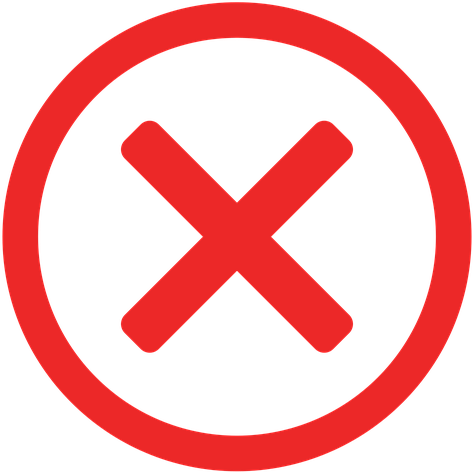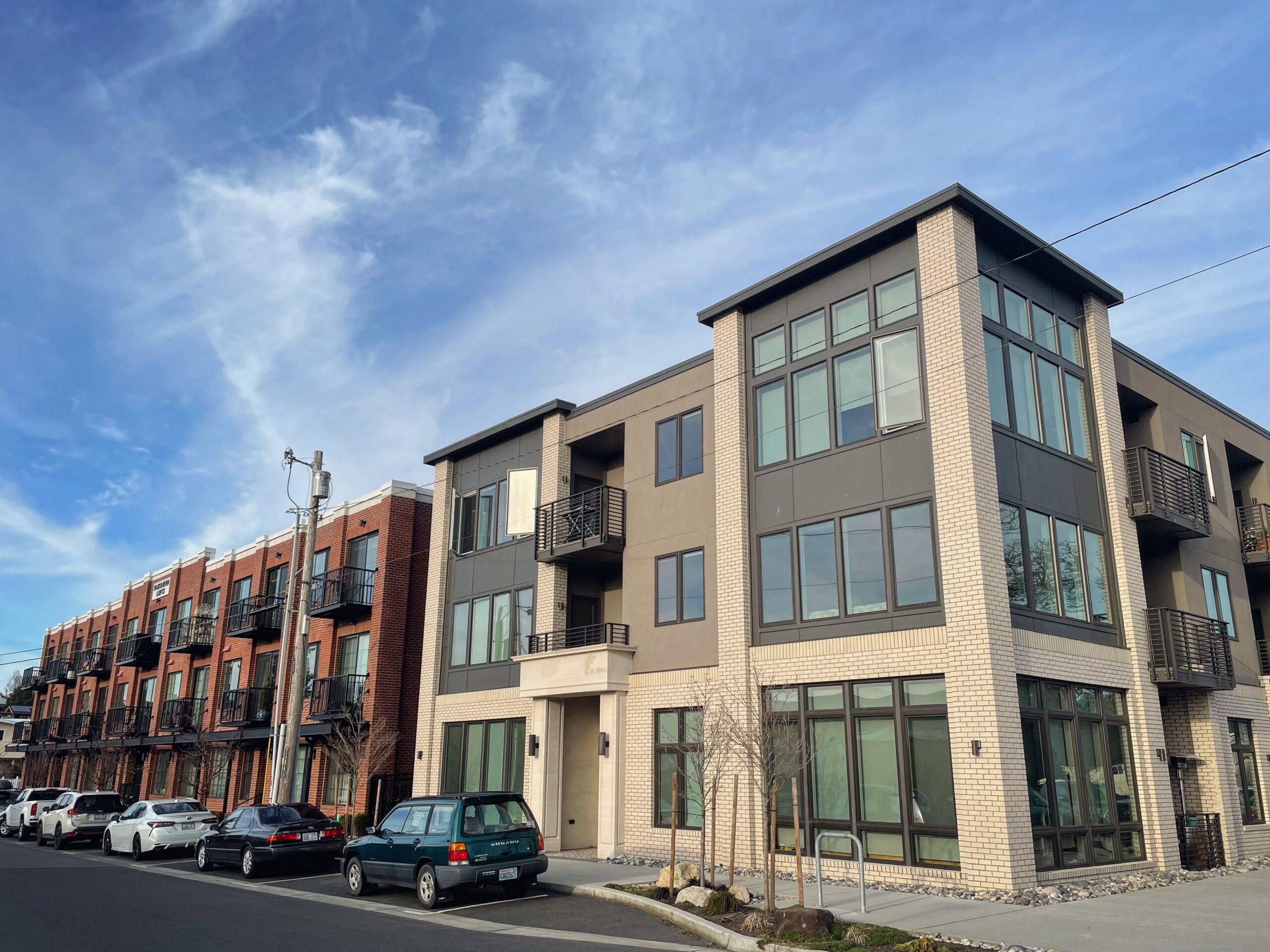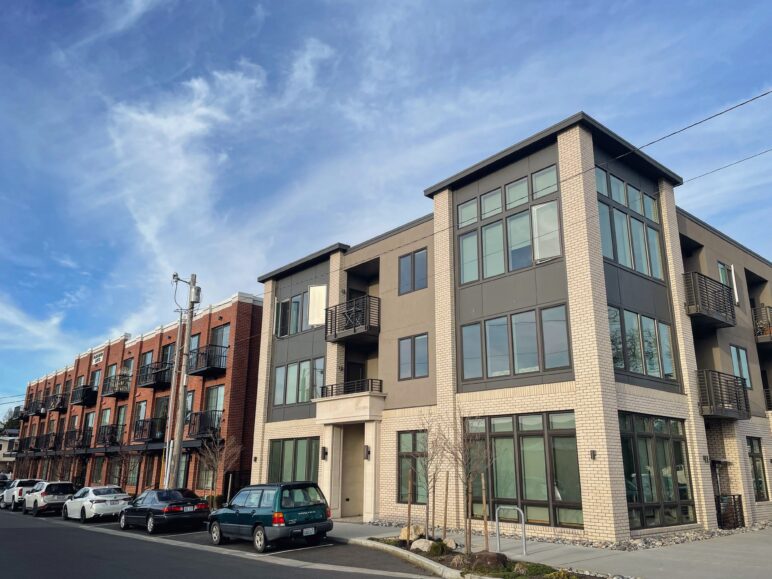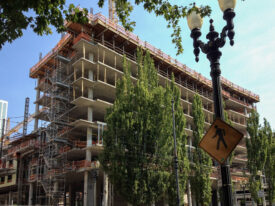Lieutenant Governor Denny Heck declared 2023 “the year of housing.” From Spokane to Skamania to Seattle to Skagit County, Washingtonians have cried out for solutions to control the state’s soaring home prices and rents and worsening instability and homelessness.
The legislature stepped up with a suite of housing affordability bills, lifting bans on fourplexes, duplexes, and basement and backyard apartments (ADUs) in cities and towns across the state; cutting red tape and costs added by delayed permitting and excessive review; opening pathways to homeownership; and making unprecedented investments in low-income housing and supportive services.
State leaders made great strides in 2023, but Washington’s communities still need more affordability solutions. A decades-in-the-making shortage will take more than a single year’s concerted action to solve.
Fortunately, this year lawmakers are stepping up again with a raft of housing bills, even though 2024 is a “short” session, only two months long. And like last year, the bills cover all three of the policy pillars necessary to take on a housing crisis, known as “the three Ss”:
- Supply: More new homes to reduce the shortage and cool rents and prices
- Stability: More protections to safeguard those with the least housing security
- Subsidy: More subsidies to help those who can’t afford what the market offers
Sightline’s expertise is on zoning and other regulatory obstacles to housing affordability, so that supply pillar is where we focus our state housing policy work. However, Sightline also supports stability and subsidy policies. Alone, each “S” is insufficient; together, they form a mutually reinforcing suite.
Below we summarize around 20 of the most impactful housing bills introduced in Washington’s 2024 session across the three Ss, plus a bonus section of other housing-related bills. Status is current as of March 1, the cutoff for passing bills.* We also note their status as of February 13*, the cutoff day for passing bills out of their house of origin. As a refresher, bills must pass out of both the House and Senate via a “floor vote” of all the chamber’s members; this occurs after the bill has been heard and amended in one or several committees of that chamber. Our icons are as follows:

Passed both House and Senate

Passed either House or Senate

Not yet passed either chamber

Dead
*Bills with a fiscal component can be exempted from the March 1 cuttoff if they are deemed “necessary to implement the budget.”
1. Supply Bills
Supply bills loosen overly restrictive zoning laws and regulations that needlessly impede home-building. Adding homes—especially in places with lots of jobs that drive high demand for housing—keeps average prices and rents lower for everyone. Supply measures support subsidy measures because lower prices and rents mean market-rate housing is more affordable to more people, which reduces the need for funding to subsidize housing. And when housing is abundant, stability measures such as rent stabilization are less likely to backfire by squeezing the supply of rentals and will still prevent gouging.

Legalize community-centered, economical housing: Co-living homes
PASSED HOUSE AND SENATE HB 1998 legalizes co-living homes statewide on all lots that currently allow multifamily housing with six or more units per lot. Co-living homes are a low-cost housing option in which each resident has a private bedroom or living quarters but shares with other residents a common kitchen, bathroom, recreational room, or other facilities. Read more from Sightline Institute and from KUOW.

Legalize lot splitting to create lots for smaller, less expensive houses
DEAD HB 1245 allows homeowners to sell off part of their house lot for the construction of another home, authorizing subdivision into lots as small as 2,000 square feet, creating more affordable homeownership choices while also providing financial options for existing owners. Read more from Sightline Institute and from the Black Home Initiative. In 2023, HB 1245 passed the House 94–2 but then died in committee in the Senate.

Legalize more homes near transit
DEAD HB 2160 legalizes four– to five–story apartment buildings within a half–mile of rail stations, and three– to four–story multifamily homes within a quarter–mile of bus rapid transit stops. It also requires housing built in these areas to set aside 10 percent of units as affordable to households earning 60 percent of area median income, excepting parcels that already meet the bill’s density requirements or that are already subject to affordability mandates.

Make parking more flexible to allow the construction of lower-cost homes
PASSED HOUSE AND SENATE SB 6015 sets new state standards for more flexible and efficient parking configurations, including legalizing tandem parking and prohibiting requirements that parking must be enclosed. Read more.

Reform building codes for small multifamily homes and energy efficiency
PASSED HOUSE AND SENATE HB 2071 instructs the Washington Building Code Council to recommend (1) changes to the residential code so that it applies to housing with up to six units and (2) a reduction of the minimum habitable space for studio apartments. (The original bill’s provisions to allow external insulation for Passive House retrofits and construction to extend into setbacks, and to prioritize tree protection over parking mandates were amended out in committee, and the tree/parking provision was amended into SB 6015.)

Legalize detached accessory dwellings in rural areas
DEAD SB 6029 / HB 2126 allow the construction of detached ADUs outside of designated urban growth areas where attached ADUs are already allowed. Read more from The Urbanist.

Prevent HOAs from discriminating against unrelated people who want to share a home
PASSED HOUSE AND SENATE HB 1054 prohibits an association of unit owners in a common interest community (a.k.a. an HOA) from regulating or limiting the number of unrelated persons that may occupy a home. It expands the protections provided by SB 5235, passed in 2021.

Ease impact fee deferrals
DEAD HB 1468 reduces red tape by repealing the state requirement for home builders to grant local governments a lien on a newly built home in order to be allowed to defer their payment of impact fees assessed on the home until after construction is completed.

Allow adjustments to urban growth boundaries
PASSED HOUSE AND SENATE HB 5834 authorizes counties to revise their urban growth areas (UGA) subject to limitations, including that revisions may not increase the net acreage of of the UGA.

Establish a housing production accountability system
DEAD HB 2113, the “Housing Accountability Act,” grants the Department of Commerce authority to approve or reject the city and county housing plans required under the GMA based on whether the plans adequately address the full spectrum of housing needs. It also creates a system of accountability for jurisdictions with plans out of compliance, requiring them to automatically permit the construction of any new housing proposal that includes a specified minimum portion of homes affordable to lower-income residents. Read more from The Urbanist.

Monitor housing need
DEAD SB 6152 requires the Washington Center for Real Estate Research to report on each county’s housing needs and prioritizes public works grants to encourage infill development or affordable housing.

Improve the State Building Code Commission
PASSED HOUSE AND SENATE SB 6291 streamlines State Building Code Commission (SBCC) operating procedures by establishing criteria for amendments to the state building code concerning timelines, adoption cycle flexibility, councilmember selection, technical advisory groups, and energy code consulting.
2. Stability bills
Stability bills safeguard housing security in conditions of rapid change. Most commonly, they provide protections for renters, such as limits on rent increases. But they also include policies to help first-time buyers to attain the security of homeownership and existing owners to stay in their homes. These policies provide near-term support, in contrast and complement to the supply measures supporting construction of new housing—both market-rate and subsidized—which are longer-term solutions that play out over years.

Enact statewide rent stabilization
DEAD HB 2114 and its companion SB 5961 set limits on the amount landlords can raise rent annually. HB 2114 caps increases at 7 percent per year, exempts buildings less then 10 years old, and allows greater increases when tenancy changes. SB 5961 amended the cap up to 15 percent, with an allowance for cities to enforce a lower cap. Read more here.

Increase funding for rental assistance
DEAD HB 2425 authorizes cities to assess an additional 0.5 percent tax on residential construction to fund rental assistance for low-income households.

Stop cities from denying permits to supportive housing
DEAD HB 2474 requires cities to vet with the Department of Commerce proposals for permanent supportive housing, transitional housing, indoor emergency housing, or indoor emergency shelters. It prohibits cities from denying a permit application if Commerce approves the proposal.

Support ownership opportunities for mobile home communities
PASSED HOUSE AND SENATE SB 6059 strengthens requirements for notices to mobile home community residents of the opportunity to compete to purchase their community if put up for sale, and it increases eligibility for relocation assistance.
3. Subsidy bills
Subsidy bills increase funding to deliver more homes to those who still can’t afford what the private market can provide. Subsidy is most commonly thought of as public dollars spent on building and operating affordable housing, but it also includes targeted tax and fee exemptions.
The high cost of housing construction and land in Washington makes it impossible to produce new housing that is affordable to those on the lowest end of the income spectrum. However, because housing construction is so expensive, the public subsidy required to produce it at scale is enormous—which is why concurrent supply policies are critical to lessen the need for subsidy. And why concurrent stability policies are critical to protect low-income people who can’t get into subsidized housing because there isn’t enough of it.

Establish a graduated REET as a permanent revenue source for affordable housing
DEAD HB 2276 imposes a new real estate excise tax (REET) of an extra 1 percent on property sales over $3.025 million and directs the revenue to the Washington Housing Trust Fund and other affordability programs. It also lowers the REET from 1.28 percent to 1.1 percent on sales from $525,000 to $750,000.

Exempt affordable housing development from sales and use taxes
DEAD HB 2219 authorizes cities to establishes a sales and use tax exemption for the construction and maintenance of affordable housing by nonprofits.

Grant sales and use tax deferrals for commercial-to–housing conversions that provide affordable homes
PASSED HOUSE AND SENATE SB 6175 allows a city to establish a retail sales and use tax deferral program for the conversion of underutilized commercial property to affordable housing. It requires a set–aside of 20 percent of units affordable to moderate incomes and half of units at or below federal fair market rents or prices.

Tax short-term rentals to fund affordable housing
DEAD SB 5334 authorizes local governments to impose a special excise tax of up to 10 percent on the furnishing of short-term rentals and to use those tax revenues only for affordable housing programs.

Create a revolving loan fund for affordable housing development
PASSED HOUSE AND SENATE HB 1892 creates a new state revolving loan fund program to administer loans to eligible organizations to support the development of housing for low–income households (earning from 50 to 80 percent of area median income).

Fund social housing
DEAD SB 5975 expands the scope of affordable housing eligible for state funding, including the Housing Trust Fund, to include social housing. Social housing means housing on land owned in perpetuity by a public housing or development authority, the state, or other political subdivision that is available to households earning up to 80 percent or 120 percent of area median income.

Increase funding for affordable ownership housing development
PASSED HOUSE AND SENATE HB 6173 authorizes cities to use revenue from sales and use tax to fund the construction of housing intended for owner occupancy that’s affordable to households earning up to 80 percent of area median income.
Other related bills

Creation of a new state Department of Housing
DEAD HB 2270 authorizes Washington’s Office of Financial Management to hire a consultant to study creating a new state Department of Housing.

Allowing neighborhood cafes in residential areas
DEAD HB 2252 would allow non-drive-through neighborhood cafes to establish in residential areas, with limited menus and hours of operation. Read more from The Urbanist.










uirements
Fortunately, HB 2126 and SB 6029 are dead. These were sweetheart bills for developers who have been trying to undermine GMA ever since it was adopted in the early 1990s. There was nothing “accessory” about this double density development. The so-called ADUs could be built anywhere on a parcel, as long as they used the same “driveway” and were on the “same” acre. In other words, anywhere on a parcel that the driveway was extended to. And an acre is an area, not a shape, so that was just a transparent ruse, not a restriction. Of course, while the new buildings couldn’t be in a wetland, the “driveway” to them could go through wetlands and over streams, further fragmenting habitat. This was really an “Air B&B anywhere you want it” bill, since there were no requirements about affordability. Worst of all, it would instantly drive up rural property taxes, forcing poorer rural landowners out and fueling gentrification: buy a 5 acre rural parcel, build that 3000 square ft. McMansion and the cottage for the maid. Don’t be fooled. These bills were not about providing housing; they were about rewarding real estate speculators and developers.